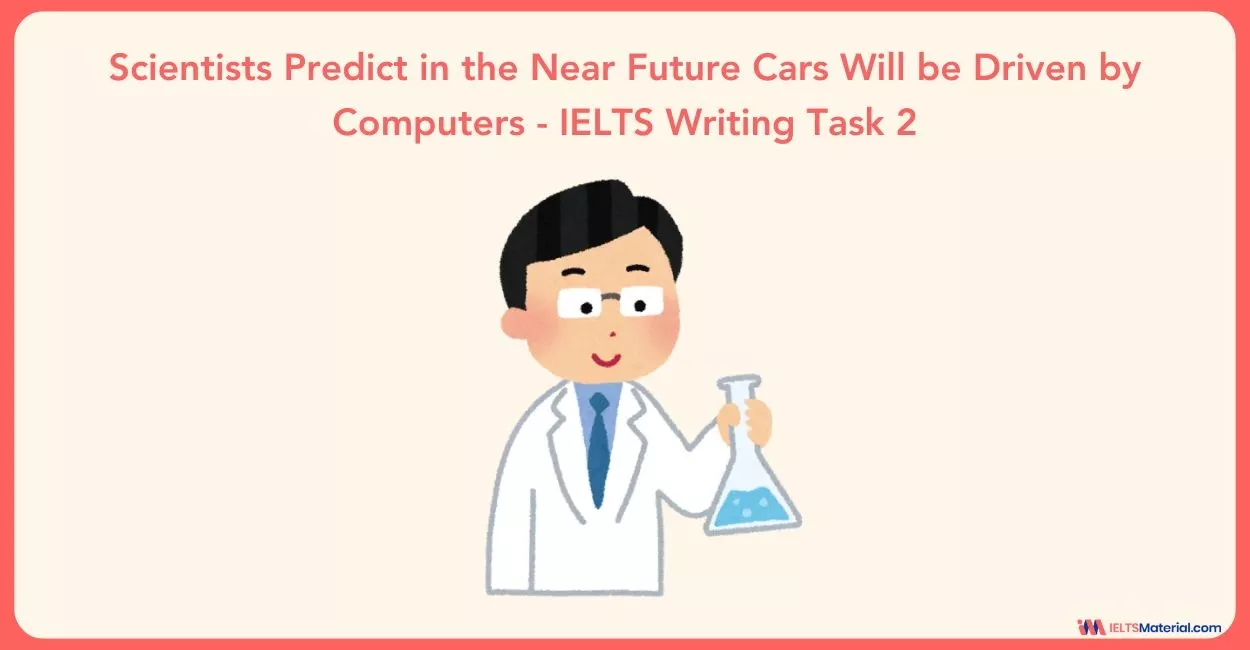Scientists Predict in the Near Future Cars Will be Driven by Computers - IELTS Writing Task 2
With the IELTS Writing Task 2 Positive/Negative Essay topic: Scientists Predict in the Near Future Cars Will be Driven by Computers are gradually changing, you will be able to find the structure breakdown and sample answer to achieve a band 8+.
Table of Contents

Try AI Essay Checker for Instant Band Score
In IELTS Writing task 2, like the 'Scientists Predict in the Near Future Cars Will be Driven by Computers,' students are asked to write a formal essay of at least 250 words, in 4-5 paragraphs, based on the given IELTS Writing Task 2 Positive/Negative essay topics.
The task is similar for both Academic and General Training with regards to the type of questions and the scoring, but the topics given for General Training will be slightly easier than Academic. Given below is a two-part/direct question essay with sample answers that will help you to practise and get a good score.
Not sure how to approach IELTS Essay questions? Take a look at IELTS Writing Task 2 Tips!
Question
You should spend about 40 minutes on this task.
Scientists predict in the near future cars will be driven by computers, not people. Why? Do you think it is a positive or negative development?
Write at least 250 words.
Structural Breakdown
|
Essay
Introduction
Body paragraph 1
Body paragraph 2
Conclusion
|
Band 8 Sample Answer - Scientists Predict in the Near Future Cars Will be Driven by Computers
It is projected by scientists that computers will undertake the operation of cars rather than drivers themselves in the foreseeable future. This anticipation is understandable and brings both negative and positive aspects.
Autonomous driving cars have received a great deal of research, and there have been great strides in automobile technology. Cars have been able to recognize human voice and dispense directions accordingly to guide drivers to their destination. As technology progresses, we will see self-driving cars that will be able to interpret and act based on their immediate environment. This is an inevitable outcome in the years to come.
Traffic-related deaths due to human error such as drink driving, distracted driving or over-speeding would be significantly reduced. Computers will be well pre-programmed and assist human drivers in the task of driving under such circumstances with a great degree of precision. Besides, it is good news for the disabled or the elderly as self-driving automobiles mean there will be no obstacle caused by physical problems or age restriction.
Even with just a minor flaw, the cars will run the risk of collisions in the event of a malfunction. This is not to mention that accidents can occur since driver-less cars cannot cope with unexpected terrains such as potholes, crowded roads in the same way as a human driver can. Furthermore, drivers’ information can be exposed by potential hackers who would take advantage of the data pool stored at a data center. The data will then be used for illegal purposes, which harms people’s interest.
In conclusion, we can understand why this trend is possible in the near future. Meanwhile, it poses both threats and opportunities for individuals.
Connect with our IELTS Experts to crack your IELTS Writing Section and achieve a band 8+
How to Write a Positive/Negative Development Essay in IELTS?
To plan and write a Positive/Negative essay IELTS while practising the IELTS Writing Task 2 sample essays or the actual exam, you can follow these steps:
- Understand the question - The first step is to carefully read the question and understand what is being asked. You should identify the problem, the cause(s) of the problem, and your view about it.
- Brainstorm your ideas - Once you understand the question, take some time to brainstorm your ideas. What are the different aspects of the problem? What are the possible causes? What are the different solutions that could be implemented? Is it a positive or a negative development?
- Organize your ideas - Once you have a good understanding of the problem and its possible solutions, it is time to organize your ideas into a logical structure.
- Write your essay - When writing your essay, be sure to use clear and concise language. Avoid using complex sentences and jargon. You should also support your claims with evidence from credible sources.
- Proofread your essay - Once you have finished writing your essay, be sure to proofread it carefully for any errors in grammar, spelling, or punctuation.
Get Better at Writing for IELTS with IELTSMaterial
Practising more IELTS writing practice tests, as well as different topics on pie charts, would be hugely beneficial for you! Talk to our IELTS experts if you are wondering how to succeed on the IELTS writing exam. Also, we're holding interactive webinars where you can learn tricks to ace the writing component of the IELTS test. Let us know how it helped you prepare by leaving a comment below!
Also check:
Practice IELTS Writing Task 2 based on Essay types

Start Preparing for IELTS: Get Your 10-Day Study Plan Today!
Recent Articles

Haniya Yashfeen


Prity Mallick

Kasturika Samanta




Post your Comments